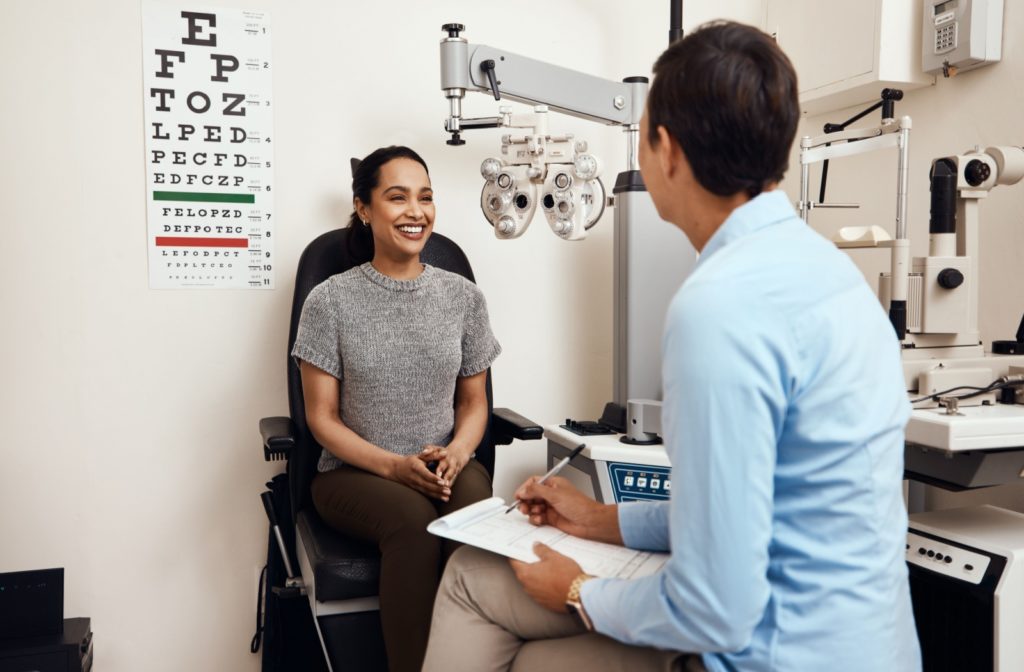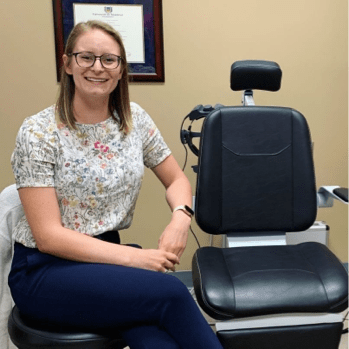Eye exams go beyond the need for a vision prescription. They are pivotal in detecting, managing, and treating possible ocular, visual, and systemic health issues.
Age, underlying health conditions, and risk factors for eye disease influence the frequency of visiting your optometrist for children, adults, and individuals aged 65 and older.
Most insurance companies will cover a full exam every two years, but other conditions may encourage annual visits or even higher frequency if monitoring certain diseases.
The Importance of Eye Exams
Eye exams extend beyond vision correction. Optometrists play a crucial role in preventing, diagnosing, monitoring, and treating ocular diseases such as:
- Dry Eye Disease: Dry eyes occur when your eyes don’t produce enough tears to keep your eye hydrated and moisturized or when your tears evaporate too quickly.
- Cataracts: Develops when the lens of the eye becomes cloudy resulting in blurry vision, and will ultimately require undergoing surgery to restore vision.
- Glaucoma: Begins by affecting peripheral vision first and works its way in. If left untreated glaucoma can lead to vision loss.
- Age-Related Macular Degeneration (AMD): There are 2 types of macular degeneration, wet and dry. Dry macular degeneration is most common and affects vision slowly. Both types of macular degeneration cause central vision loss.
Comprehensive eye exams can uncover early signs of general health conditions such as:
- Diabetes: Signs of diabetic changes can appear in the eye even before an individual has been diagnosed with diabetes.
- High blood pressure: Changes in blood vessels in the back of the eye are signs of high blood pressure.
- Heart disease: Signs of heart disease can be seen in the retina or on retinal scans.
- Thyroid disease: Symptoms of hyperthyroidism include protruding eyes, retracting eyelids, dry eyes, and blurry vision.
Many of these conditions can manifest in the eye before other symptoms become obvious, making regular eye exams a critical component of preventative healthcare.
Comprehensive Eye Exams
A comprehensive eye exam includes a visual assessment and overall health assessment of your eyes.
During a comprehensive eye exam, your optometrist will assess your medical and ocular history, vision clarity including eye movement, ability to focus, eye coordination, and peripheral vision, and the internal and external health of your eyes
Factors influencing the frequency of comprehensive eye exams include age, general health status, and specific risk factors. Our comprehensive eye exams last around 30 minutes, offering a thorough evaluation of ocular health and an opportunity to answer any questions and address concerns.
Individuals who don’t require vision correction are still advised to visit their optometrist for comprehensive eye exams. Vision can change over time, and early detection of changes is important for effective treatment and maintaining optimal vision health.
Children’s Eye Exams
According to the Canadian Association of Optometry, children are encouraged to visit their optometrist annually between the ages of 6 months to 18 years. Children can have their first eye exam as young as 6 months old!
Eyesight fully develops at around 2 years old, and our eyes continue to grow and develop during puberty and until age 20 to 21. Vision stabilizes around this age.
In certain cases, children may be advised to undergo cycloplegic refraction. When the optometrist observes excessive strain on the child’s eyes during the vision assessment, they may decide to administer drops to dilate the eyes and relax the muscles. This helps the optometrist in accurately determining the child’s refractive error.
Adult & Senior Eye Exams
The Canadian Association of Optometrists suggests that adults between the ages of 20 and 39 should have an eye exam every 2–3 years. This frequency should increase to every 2 years after the age of 40.
A comprehensive eye exam is particularly recommended to undergo at age 40, as this is when early signs of eye disease or vision changes may appear.
Adults using contact lenses or those diagnosed with diabetes are encouraged to opt for annual exams due to their higher risk of ocular changes and conditions.
For individuals over the age of 65, annual comprehensive eye exams become even more essential. Age increases the risk of developing eye conditions and visual concerns like:
- Cataracts
- Age-related macular degeneration (AMD)
- Glaucoma
- Glare sensitivity
- Difficulty seeing at night and low vision
- Vision injuries related to falls

Contact Lens Exams & Fittings
Contact lens wearers are encouraged to visit their optometrist annually for exams and lens fittings, as contact lens prescriptions expire yearly.
These exams confirm that your eyes remain suitable for contact lens wear and allow for any necessary adjustments in your prescription. Neglecting these visits can lead to using outdated or improperly fitted lenses, causing discomfort and potentially damaging the eyes.
Diabetic Eye Exams
Individuals with type 1 or 2 diabetes are encouraged to visit their optometrist annually for a diabetic eye exam to maintain healthy vision.
Individuals with diabetes have a higher risk of developing eye conditions like:
- Diabetic retinopathy: This is caused by high blood sugar from diabetes and may cause vision loss and blindness.
- Macular edema: Results in swelling of the macular area of the eye, leading to central vision distortion.
- Cataracts: This risk of developing cataracts increases when diabetes affects blood vessels in the eye.
- Glaucoma: Individuals with diabetes are twice as likely to develop glaucoma.
These conditions can manifest and progress with no to minimal symptoms. Regular diabetic exams are key to detecting and managing eye conditions before they worsen.
During a diabetic dilation exam, eye drops are used to dilate the pupils for a better view of the back of the eye. The optometrist examines the retina and optic nerve for signs of diabetic retinopathy and other eye diseases.
To assess the retina, fundus photos, and OCT scans help to capture detailed images of the macular, optic nerve, and blood vessels.
Book an Appointment
Eye exams are key in maintaining visual clarity, ocular health, and overall general health. The frequency of these exams depends on an individual’s age, underlying health concerns, and risk factors for eye diseases.
If it’s been a while since your last eye exam, consider scheduling one today. Contact our team at Beyond 20/20 Optometry to book your next eye exam!




